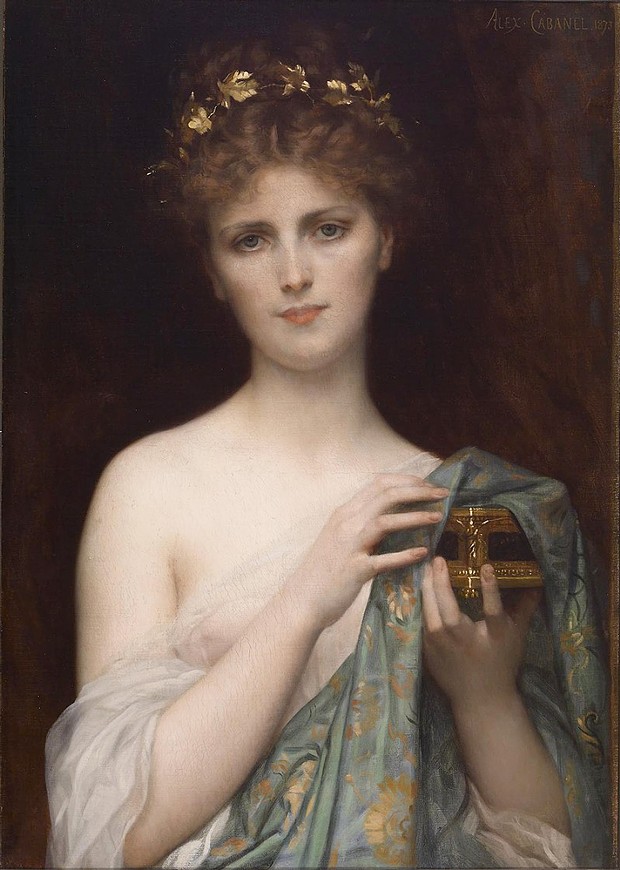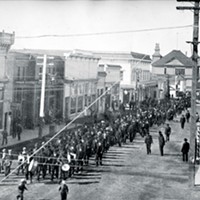
Swedish soprano Christine Nilsson posing as Pandora in a painting by Alexandre Cabanel, 1873.
[
{
"name": "Top Stories Video Pair",
"insertPoint": "7",
"component": "17087298",
"parentWrapperClass": "fdn-ads-inline-content-block",
"requiredCountToDisplay": "1"
}
]
"[Hesiod's] personality behind the poems is unsuited to the kind of 'aristocratic withdrawal' typical of a rhapsode but is instead argumentative, suspicious, ironically humorous, frugal, fond of proverbs, wary of women."
— The Oxford History of the Classical World
Misogyny — hatred of or contempt for women — goes back a long way, at least as far as the ancient Greek poet Hesiod, around 700 BCE. Three hundred years later, in the Timaeus, Socrates warns men that if they live immorally they will be reincarnated as women. Later yet, Saint Paul advised, "Let your women keep silence in the churches: for it is not permitted unto them to speak, but they are commanded to be under obedience." More recently, Friedrich Nietzsche claimed that "stricter controls on women was a condition of every elevation of culture." Think we're beyond all that? Despite passage by both houses of Congress 50 years ago, the Equal Rights Amendment (which stated "equality of rights under the law shall not be denied or abridged ... on account of sex") still hasn't been formally ratified. And don't get me started on SCOTUS nullifying Roe vs. Wade: misogyny, at its purest.
Hesiod, who probably lived in Boeotia in Central Greece at about the same time as Homer, was a farmer to whom the Muses gave the gift of poetry. Most authorities believe he was a real person and that he obtained his material both from early Greek rhapsodes (professional storytellers) and from Egyptian sources. He's best known for two long poems: Works and Days, in which he lays out the "Five Ages of Man," and Theogony, the story of how the gods were created.
Before the creation of women, in Hesiod's telling, men experienced a Golden Age. "They lived like gods without sorrow of heart, remote and free from toil and grief: miserable age rested not on them; but with legs and arms never failing they made merry with feasting ... They dwelt in ease and peace." That all ended when the Titan Prometheus gave men the gift of fire, having stolen it from the gods. In retaliation, Zeus (a) bound Prometheus to a rock where every day an eagle ate his liver, which grew back overnight, and (b) punished men by giving them "an evil thing for their delight," i.e. women.
The first woman was Pandora, whom the god Hephaestus molded from clay according to Zeus' specifications. She carried a jar, in Greek pithos (not a box), having been told never to open it. Well, duh. She did, of course, (otherwise it wouldn't be much of a story), releasing into the world all the evils inside: labor, old age, sickness, death, worry, crime, hate, envy and all the rest. She quickly put the lid back on, preventing the last evil, hope, from escaping. Why hope? The idea is that we prolong life's torment by hoping for a better life, which is always beyond our reach.
Pandora was only the start of troubles for the bros. From Pandora, according to Hesiod, emerged "the race of women and female kind: of her is the deadly race and tribe of women who live amongst mortal men to their great trouble." The grumpy old poet did allow that on a rare occasion a man can find a good wife but he couldn't stop himself, adding, "evil contends with good."
So much for the Golden Age. Hesiod then told of the Silver Age, when people lived most of their lives as children (and when males were dominated by their mothers); followed by a Bronze Age, during which men were tough and war was their passion — they eventually destroyed each other; then an Age of Heroes, corresponding to the Mycenaean age when men fought and died at Troy (because of, yup, a woman named Helen, the fairest of all). And finally, he described the Iron Age, the gloomy age in which Hesiod lived: "Hateful strife bore painful Toil, Neglect, Starvation, and tearful Pain, Battles, Combats."
That was 2,700 years ago. Of course, things are much better now.
Barry Evans (he/him, [email protected]) would still buy Hesiod a cup of coffee and a scone, since he reminds him of guys he has known.
Speaking of...
-

A Brief History of Dildos
Apr 11, 2024 -

Humboldt Bay Timeline
Oct 12, 2023 -

Chinese Again in Humboldt, Part Three
May 25, 2023 - More »
more from the author
-
The Myth of the Lone Genius
- Jun 6, 2024
-
mRNA Vaccines vs. the Pandemic
- May 23, 2024
-
Doubting Shakespeare, Part 3: Whodunnit?
- May 9, 2024
- More »
































